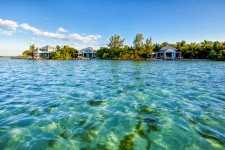Acknowledging Tourism Growth Through the Creation of Eco-Friendly Self-Sustaining Destinations

Ambergris Caye, Belize, April 27, 2017 (Newswire.com) - Over the years, the continuous growth of tourism has been linked to progress and incorporating an increase in the number of new destinations. Developers create a serious impact on the environment and the need for eco-friendly self-sustaining destinations all over the globe.
Sustainable development, or meeting the requirements of the present without compromising the necessities of the future generation, is now the trend which most developers are practicing to provide various accommodations with useful features without trading off the natural resources.
The optimal utilization of natural resources for national development on an evenhanded and self-sustaining basis to provide a distinct visitor experience and an enhanced value of life is the main goal of a sustainable tourism.
Environmental sustainability includes the optimal use natural resources, maintaining conservation processes and conserving the natural wealth biodiversity.
The goal of achieving the physical integrity involves maintaining and improving the quality of landscapes in both the urban and rural areas, prevention of the physical and visual dilapidation of the environment, restoring built inheritance and conventional design like chattel and plantation houses, and land use setting up, zoning regulation, ecological administration.
In line with that, the biological diversity includes the preservation of natural areas, habitats and wildlife and diminishing harm to national parks, biospheres, botanical gardens, and even aquatic parks.
Belize, as one of the Caribbean heritage sites, minimizes the use of inadequate and non-renewable resources in the improvement and function of tourism amenities and services through energy-efficiency measures, the use of unconventional energy like solar, wind and geothermal energy and water conservation procedures.
The goal of ensuring the practicality and competitiveness of tourism destinations and enterprises would continue to prosper and bring profit in the long term.
Local prosperity, on the other hand, could be achieved by maximizing the involvement of tourism to the economic affluence of the host destination, including the quantity of visitor spending that is retained locally.
Human resources sustainability measures mean having secure work and income-earning contingencies. Increasing the number and quality of local occupations produced and substantiated by tourism, including the level of compensation, state of service and access to all, without discrimination by gender, race, disability or in other ways.
Investing in an eco-friendly self-sustaining destination like Belize would incur so many benefits. For instance, the tradition of banking confidentiality in Belize entices people to migrate there. The people likewise play a major role why expats choose to visit and in the long run stay in Belize. In fact, Belize is one of the top 10 happiest countries in the globe. Therefore, it is just right to say that Belize is an attractive country with fine-looking people.
The considerable means of transportation would encourage investors to risk capital in Belize. Aside from being colorful, buses are safe and, of course, affordable. Taxis are not metered and fares are highly flexible.
Investing in an environmentally friendly business will help you decrease your impact on the environment and conserves natural resources. With the barrier reefs, tropical forests, mountains, rainforest and the major cave system in Central America, Belize has an enormous amount of attention on its natural wonders. It will boost economic growth, benefit the local people, promote tourist spots and improve the standard of living.
Source: Coldwell Banker Ambergris Caye
